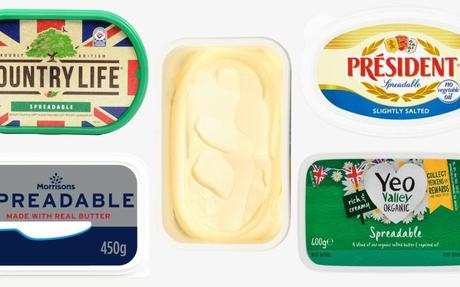
My butter lives in a duck-shaped bowl my father gave me years ago. The duck head is a little wonky where it's glued back on, but it sits proudly on the worktop next to my grandmother's pepper mill.
I'm in the minority: most of us buy Lurpak, or Anchor, or one of the supermarket own-brand equivalents, in a plastic container. They promise that they are spreadable straight from the fridge. According to market research analysts Kantar, we buy a third more spreadable butter in a container than regular butter blocks wrapped in paper or foil.
I understand. Hard butter is annoying. If you try to spread it on bread, the crumb will tear. With modern central heating, if you keep the butter out of the refrigerator, there is a risk that it will turn dark yellow and smell rancid if your turnover is not reasonably high. And anyway, with our minimalist kitchens, many of us prefer to keep our butter neatly out of sight.
Spreadable butter is a market that has been growing since the early 1990s when it first arrived in Britain with the aim of competing with margarines such as Flora (New Zealand takes credit for the invention; it is a subject that is important to them).
Until a decade ago, Kiwi fridges contained warm 'butter conditioners' to keep the fridge at the perfect temperature. When someone pointed out that storing a heated container in a chiller made no sense, the tradition was dropped, to the outrage of many New Zealanders).
The method for making true spreadable butter is based on butter's complex mixture of fats, all with different melting temperatures. By melting the butter and cooling it gradually, the fats with the lowest solidification point can be removed, leaving behind the fats with a higher freezing point that will remain soft in the refrigerator. There is a certain amount of processing required to turn it back into butter (mixing back the milk solids and the water, which separates during melting), but it's still just butter.
That is not the case with most of what you find in the supermarket now. Very few spreadable 100% butters still exist (notably Kerrygold, Président and an M&S version). Other manufacturers found an easier way: simply beat softened butter with about half its weight in oil. However, it is no longer butter, because legally butter must consist of at least 80 percent butterfat. For example, Lurpak Spreadable is made up of 52 percent butterfat and 26 percent canola oil, with water making up most of the remainder, while Anchor Spreadable is about 41 percent butterfat and 33 percent oil.
The story continues
The process is so simple that you can easily do it yourself - and save money. To make a spreadable anchor, let 200 g of butter come to room temperature and then beat with an electric mixer with 145 ml of oil and 4-5 tablespoons of water at room temperature. Beat for about a minute until you have a smooth, mayonnaise-like consistency. Pour into a bathtub and let cool. That is it. 400g spreadable anchor for €2.27 (based on average cost), saving €1.08 on the cost of a store-bought bath.
For producers, this method is also a fantastic deal, because oil is much cheaper than butter. And by using virtually the same branding on the spreadable tubs as on the packaging of their actual butter, they can charge almost the same price. Yes, the packaging says it's a blend and calls it a "spreadable" rather than "spreadable butter" - but that's not exactly what the customer notices when he picks up the familiar container. Plus, it's hugely confusing when there's another line of products called "buttery spreads," including Clover or I Can't Believe It's Not Butter, which contain buttermilk and not butter, plus many ingredients like palm oil and flavorings, which are markers for ultra-processed foods.
It is true that spreadables, which are made with a mixture of butter and canola oil, contain less saturated fat than pure butter, due to the fact that canola oil contains less saturated fat than butter.
According to NHS guidelines, we should still replace saturated fats with unsaturated fats, although there is far from consensus on this in the medical community. As Professor Tim Spector, blogging in the British Medical Journal, noted: "No study has successfully shown that switching to a diet low in total or saturated fat can reduce heart disease or mortality."
But can these spreadable, not-quite butters, health credentials aside, taste as good as the real thing? And is it worth paying for Lurpak when the supermarket's own labels can be half the price? To help me sample 15 from the chilled aisles, I enlisted the help of dairy queen and cheese legend Mary Quicke, whose family has been making cheese on their Devon farm for 14 generations.
In the 1970s, Quicke's paved the way for the revival of artisan cheese making in Britain, winning numerous awards and expanding its range to include half a dozen cheeses and whey butter, a byproduct of the cheese. As an international cheese and butter judge and founder of the British Academy of Cheese, there is no one better qualified than Mary to decide whether spreadable butter is a success.
The price-quality ratio taste test
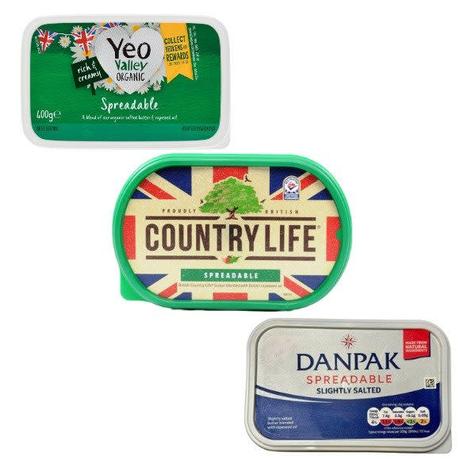
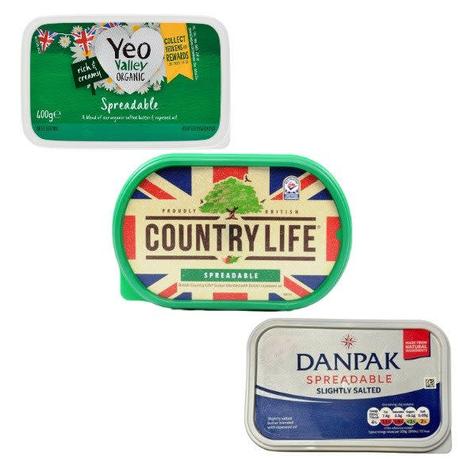
Lidl Danpak Spreadable Lightly Salted
£2.09 for 500g (42pcs/100g)Very pale, soft and shiny, with an oily odor. With 64 percent butter you would like to taste something, but the taste is overwhelmingly that of cheap oil. You wouldn't want to spread this thick.
Country life British Spreadable
£3.50 for 500g at Sainsbury's (70p/100g)Another pale delicacy, with only 50 percent butter and very little aroma, but a strong taste of cabbage oil. Foreign. Enough to put you off your toast.
£4.50 for 400g at Sainsbury's (£1.12/100g)Yeo Valley organic spreadable mix of butter and rapeseed oil
£2.09 for 500g (42pcs/100g)I'm a fan of Yeo Valley and the organic properties are good, but this 50 percent butter spread tastes strangely like leafy greens, perhaps due to the less processed organic oil. Stick to regular butter.
Aldi Nordpak Spreadable Lightly Salted
£2.09 for 500g (42pcs/100g)Although very spreadable, it has the same unpleasant, cabbage-like rapeseed taste as Country Life. At most it is a lubricant to moisten the toast.
Tesco Butterpak Salted Spread
£4.46 for 500g at Tesco (89p/100g)Pale, with a soft texture like a bowl of thick crème fraîche. It's quite greasy and you can smell it too. While the oil isn't bad, it's still not butter to me. It leaves a strange, peppery roughness on the back of the pallet.
Lurpak Lightly Salted Spreadable
£3.35 for 400g at Sainsbury's (84p/100g)Very oily, with a grape seed flavor. The flavor up front has a buttery note, but falls flat at the end.
Anchor spreadable mix of butter and rapeseed oil
£2.09 for 500g (42pcs/100g)This looks soft and shiny, like margarine, but it tastes like cheap butter. It has a strange, wheaty, biscuity taste - great for toast.
Aldi Greenvale Valley Spreadable
Very similar to the Anchor. Very soft and primrose in color with a light aroma of oil. The oil is relatively mute and has some buttery notes, but the oiliness comes out when heated.
Lidl Dairy Manor British Spread Lightly Salted
£2.40 for 500g (48pcs/100g)Very similar to the previous two. Has an oily aroma with some butteriness. A nice dash of salt, but overall a bit unremarkable.
Waitrose spreadable
£2.55 for 250g at Sainsbury's (£1.02/100g)Choose this one if you want something low in salt. Very greasy and pale. I didn't like the smell, but there are butter notes.
Kerrygold Pure Irish butter
Looks yellow and has a strong buttery flavor - no oil notes. Quite salty and I'm not sure about the waxy texture. However, it certainly has merit and I wouldn't judge if I was served this in a cafe.
£2.75 for 250g at Ocado (£1.10/100g)
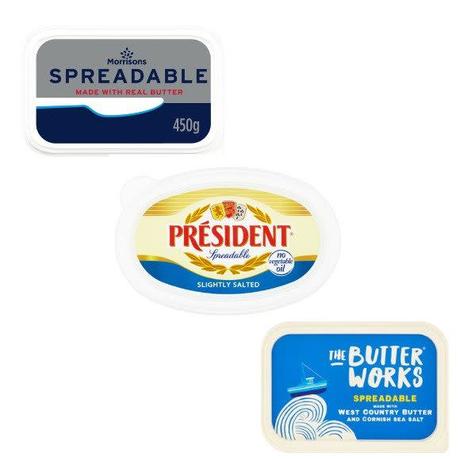
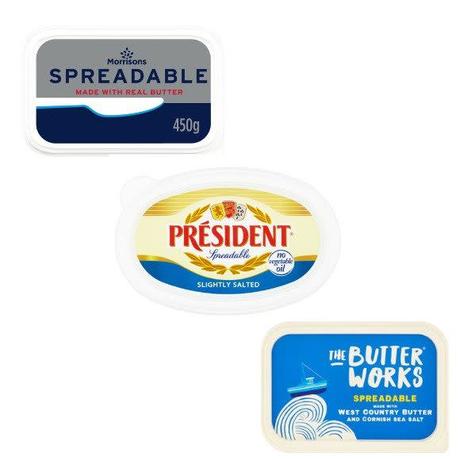
Président Spreadable Lightly Salted
All butter and no oil here, but while it's on the firm side, it's still spreadable. One for lovers of continental-style cultured butter, with a hint of cheesy flavor. Butter with character.
£2.40 for 250g at Waitrose (96p/100g)M&S Softer butter
£1.97 for 450 grams (44p/100g)This is actually just butter. I can tell from the texture alone that there is no oil in it. I'm not sure if it's spreadable straight from the fridge, but it would be great spread thickly on toast.
The Butterworks Spreadable West Country Butter
If it spreads well, it will taste a bit bland at first, but develops into a good buttery flavor without an oily taste. The packaging should be checked carefully to see that it is a mixture of oil and butter, and not pure butter.
Morrisons spreadable with real butter
A higher butter content than some, but with a gently unfolding flavor rather than the punch of cheap butter, and no greasiness at all. One that you can use for both sauce and spreading. Best for value.
